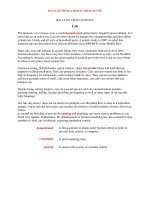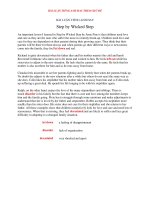BÀI LUẬN TIẾNG ANH HAY HIV infection and AIDS
Bạn đang xem bản rút gọn của tài liệu. Xem và tải ngay bản đầy đủ của tài liệu tại đây (251.35 KB, 1 trang )
BÀI LUẬN TIẾNG ANH HAY THEO CHỦ ĐỀ
BÀI LUẬN TIẾNG ANH HAY
HIV infection and AIDS
HIV, short for "human immunodefiency virus" is a virus that progressively destroys the body's
immune system. It does so by killing or damaging cells of the body's immune system.
In the early stages, HIV infection may have no symptoms or just symptoms of a flu-like illness.
However as the disease progresses, the symptoms become progressively more severe. This may
take several years to manifest.
AIDS (acquired immunodeficiency syndrome) is the advanced stage of HIV infection. The
body's immune system has been largely destroyed and it is susceptible to many life-threatening
diseases and certain cancers.
HIV infection reached world wide epidemic proportions since emerging in the 1980s.
Transmission is mostly done through unprotected sex, the sharing of syringes or needles, and
from infected mother to baby during pregnancy or birth. However there is no evidence that the
infection can be spread through saliva or casual contact.
In the final stages of disease where the body has practically no immune system, all sorts of
opportunistic infection can affect the body. The inevitable result of this is death.
Precautions that can be taken to prevent HIV infection include having no unprotected sex
especially with someone you do not know well even if he or she shows no symptoms of
infection. Also do not share or repeat the use of needles and syringes. The best thing to do is to
not to have multiple sex partners and not to take drugs. AIDS is a killer. Your life is too precious
to take chances with it.









